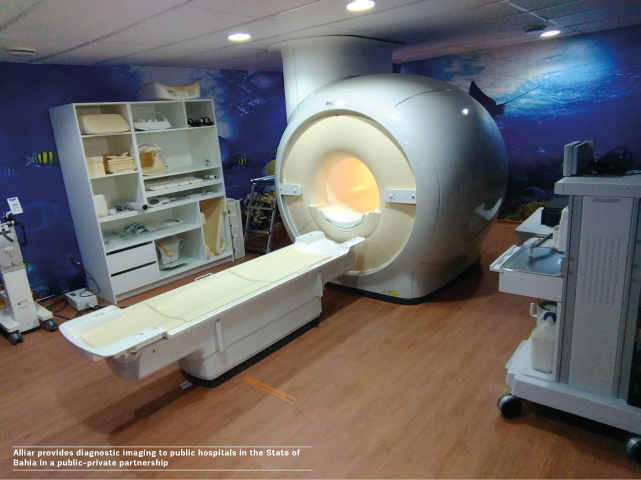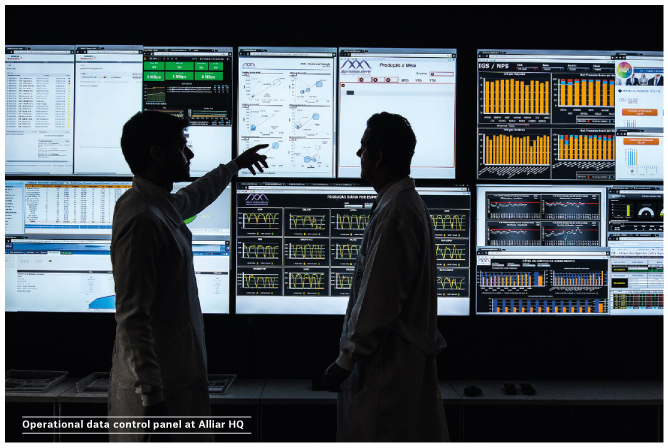HealthManagement, Volume 18 - Issue 3, 2018
Alliar’s
innovative business model and IT systems mean that patients in remote locations
have access to standardised, high-quality exams in any of its patient centres
across Brazil.
Intro: Parauapebas
Parauapebas is a small town located in north Brazil, next to the Amazon rainforest. It sits 2,000 km away from São Paulo, the country’s largest city and the headquarters for Alliar Médicos à Frente (“Alliar Physicians Ahead”,) a leading Brazilian diagnostics imaging company. Despite the distance, Parauapebas’ inhabitants are served daily by Brazil’s top radiologists and MRI technicians. The concept is simple: patients are positioned on their local MRI by a nurse, the machine is remotely operated by specialised technicians, who are sitting in a command centre located across the country, and the images are uploaded to the cloud, allowing Alliar’s radiologists to write their reports wherever they may be. The benefits are threefold:
- patients
in remote locations gain access to the country’s best professionals
- Alliar
is able to offer standardised, high-quality exams in any of its patient
centres; and
- operating
costs are reduced, as “commandcentre” technicians are able to simultaneously operate
as many as 3 MRI machines.
This unique model—the world’s first of its kind— came to life as a result of a daily challenge faced by Alliar: to provide quality diagnostics in a country of continental dimensions.
Business model
Alliar was formed in 2011, with the merger of four regional leaders in diagnostic imaging. Backed by a local private equity fund, the company set out to build a nationwide presence by acquiring local, radiologist-owned companies in key cities. The founders of the acquired companies became Alliar shareholders and were kept in charge of daily operations, while their brands were leveraged to open new patient centres in nearby cities. During this initial cycle, which concluded by early 2014, Alliar completed 20 acquisitions throughout Brazil, an intense phase of mergers, acquisitions and integration with a focus on building up a robust IT platform and capturing the low-hanging synergies. At the end of this cycle, despite being very robust, Alliar’s imaging-focused, geographically-decentralised model lacked the capability to fully capture all potential synergies.
From mid-2014 until the end of 2017 the company went through its second cycle, which shifted focus towards a fully integrated, cloud-based IT platform. During this cycle, the company also implemented several managerial tools, such as zero-based budgeting, lean manufacturing and balanced scorecard. Relevant synergies were captured from the centralization of 12 call centres (previously located in different cities) into just one contact centre and from economies of scale, mainly in procurement, maintenance and personnel costs.
At this point the full potential of the business model became evident. By combining centralized processes and a strong local presence, supervised by each company’s founders, Alliar was able to offer the friendly and warm services of small business, while delivering the financials expected of a large company.
Technology as an enabler
To successfully run more than 120 patient centres spread throughout Brazil, Alliar relies heavily on information technology. In spite of having conducted 25 acquisitions, there is no legacy—all the company’s centres run on four commercial-based systems: a cloud-based RIS (radiological information system), a single PA CS (picture archiving and communication system), a nationwide ERP (enterprise resource planning system) and a contact-centre system. Technology has been ingrained into the company’s DNA since day one—operating under a fully integrated IT platform is what has allowed Alliar to develop innovative approaches to common industry problems.
MRI remote command centre
By 2013, due to the lack of expert technicians, it was not possible to run specific protocols in all of our sites during all commercial hours. For instance, if a patient with a heart condition contacted the Parauapebas service centre for a heart MRI , availability was limited to the timeslots in which an expert technician was on site to run the exam. After implementation of the remote command centre, Alliar is able to offer any type of exam anywhere, anytime. An interesting side benefit is the cost savings derived from the project. Modern MRI s are able to run by themselves most of the time, just like an aeroplane flying on autopilot. For that reason, Alliar’s expert technicians operate up to three MRI s simultaneously, reducing the number of required technicians. Finally, with the command centre the quality of the exams has increased to a point where the number of times a patient has to come back to redo an exam has decreased more than 50%. As of today, Alliar remotely operates more than 120 MRI s and is starting to implement the same model for its CT scans.


Contact centre
On a regular day, Alliar receives more than 30,000 contacts through different platforms (phone, web or mobile app). This is the beginning of the patient’s journey, as the contact centre agent has to match the patient’s desired schedule with the availability of the chosen service centres. With all contacts going through a centralised operation, Alliar employs a sophisticated algorithm to maximise the capacity utilisation of its machines. Such a platform is also evolving to use AI/ machine learning to enhance the patient’s experience. The company expects to reduce by 50% the interaction time between patients and agents, drastically reducing errors and costs, while also improving its net promoter score.
You might also like:National Teleradiology System of Turkey: Motivation, Technology, Realisation, and Beyond
Patient experience
AI and algorithms are also being used at the reception and production areas of Alliar’s service centres, leading to less waiting time for patients. Real-time tracking allows the São Paulo-based management team to monitor what is happening in each and every patient centre. From how long a certain patient is waiting, to the net promoter score attributed by someone who has just concluded their exams, no information is overlooked. At the company’s headquarters, large flat screen TVs display operational data, going as far as highlighting whether specific doctors or health plan operators are requesting fewer or more exams than expected.
Serving the less privileged
Brazil’s public healthcare sector assists individuals who do not have access to private services. It covers 75% of the population but runs on a budget roughly the same size as the private sector’s. In partnership with the government of the State of Bahia (northeast region), Alliar has established the country’s first public-private partnership (PPP ) focused on diagnostic imaging. Under the PPP agreement, worth over US$300 million, Alliar is responsible for upgrading facilities, installing new equipment and running the diagnostic imaging centres of 11 public hospitals over a period of 11.5 years. When compared to the previous state-run centres, the PPP delivers more exams, with incomparable quality and at a lower cost to the taxpayers. This successful partnership is the subject of a 2016 case study by the World Bank’s International Finance Corporation (2016), and demonstrates that technology-based, for-profit healthcare companies can have a profound impact on the life of underprivileged citizens.
New possibilities
As it further develops the command centre technology for MRI and CT scans, Alliar continues to push the boundaries of its business. The company has just started a new division focused on remotely operating machines for third-party companies. This service is geared towards hospitals and smaller patient centres, where idle equipment makes it expensive to employ full-time technicians. The offering also includes outsourcing of the exams’ reports to Alliar radiologists and their storage on the company’s cloud platform. By subcontracting core activities, clients are effectively engaging in a new kind of business: imaging lab-tolab. If this is indeed the future, you could soon find an Alliar-operated MRI close to your home—wherever you may live.
2018 onwards: Alliar’s third cycle
By leveraging the full potential of its IT systems, Alliar has been able to gain scale, improve productivity and reduce costs, becoming competitive not only in the private market but also in the underserved public sector. Glancing to the future, with heavy usage of AI, the company sees interesting opportunities, such as its command centre being further automated (technicians only overseeing the quality of the exams), agents at the contact centre no longer talking to patients (unless specific situations occur), and medical doctors concentrating their effort on further understanding rare diseases, leaving routine cases to the machines’ AI . Altogether, these initiatives should keep Alliar on the leading edge, making Brazil’s diagnostics imaging sector as innovative as any other in the world.
Key Points
- Alliar
is a leading Brazilian diagnostics imaging company
- Alliar
offers standardised, high-quality exams in its patient centres across Brazil,
with innovative use of technology and increasing use of AI and algorithms
- Alliar
remotely operates more than 120 MRIs and is starting to implement the same
model for its CT scans
- Alliar
has established Brazil’s first public-private partnership to provide diagnostic
imaging in 11 public hospitals in the State of Bahia








